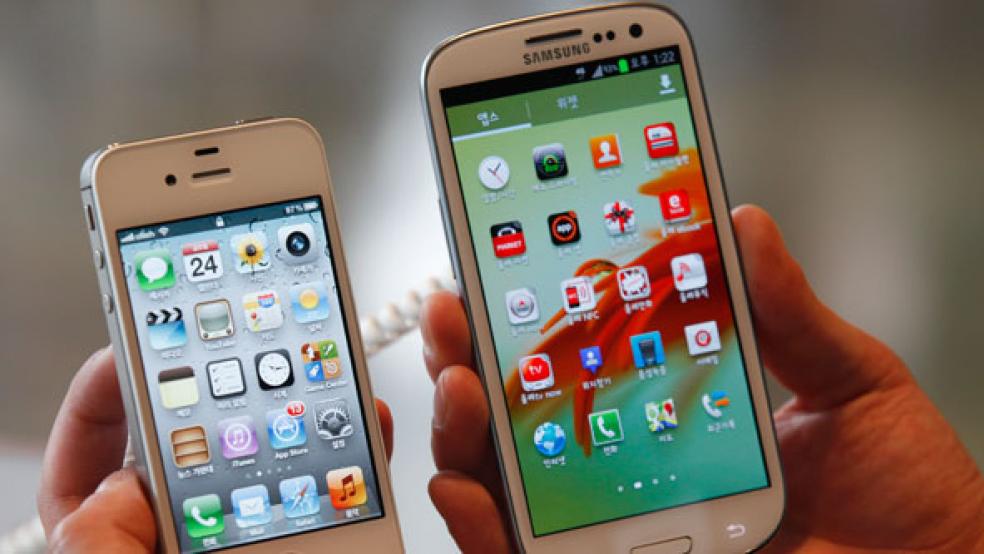Since hitting an all-time high of $702.10 in September 2012, shares of Apple (NASDAQ:AAPL) have experienced a precipitous 40 percent decline, thanks to a combination of product fatigue, a perceived lack of new ideas, botched application launches, and increased competition from its rivals.
Indeed, Apple’s fall from grace (at least in the eyes of investors) has largely coincided with the rise of Korean electronics giant, Samsung (PINK:SSNLF), whose Galaxy-branded smartphones have become the most popular mobile devices worldwide this side of the iPhone.
“It’s pretty interesting to see just how far [Samsung has] come in the last few years. I think a lot of that has got to do with the fact that they’re putting out devices on operating systems now that are pretty stable, reliable, and useful. The devices are great and they are being marketed well. It’s just a perfect combination of everything coming together,” Roy Choi, managing editor of tech news website TechnoBuffalo, told Minyanville.
"At the Consumer Electronics Show this past year, I think Samsung was the biggest, most populated booth. People were just trying to get in to see what they had," Choi continued.
According to China-based research firm TrendForce, Samsung shipped an impressive 65 million smartphones in the first quarter of the year, which represented close to 30 percent of the global smartphone market. Apple, on the other hand, shipped some 37.5 million iPhones in the same period, nabbing the company a 17.3 percent share.
Just as Microsoft (NASDAQ:MSFT) was Apple's archrival during the PC era, Samsung appears to have beat out others, including BlackBerry (NASDAQ:BBRY) and Nokia (NYSE:NOK), to become Apple’s chief nemesis in the age of mobile devices.
But not everyone thinks that Samsung is Apple’s greatest existential threat. Dr. Richard Windsor, founder of the mobile-focused blog Radio Free Mobile and a former tech analyst at Nomura, told Minyanville that he considers Google (NASDAQ:GOOG) to be the main competitor for Apple in the long run, which explains why Apple is partnering with Yahoo (NASDAQ:YHOO) to develop mobile services and reduce its reliance on Google.
"In the whole mobile ecosystem game, you either make money on devices and software on the devices, or you make money by monetizing usage,” Windsor said. “Now, Apple makes money by selling devices and Google makes money by monetizing usage. So at the moment, they don’t really compete against each other. But in the longer term, hardware is likely to become more commoditized, and Apple is looking at how to grow their revenue long-term when that time comes.”
“If you look at a smartphone, every single one in the world is pretty much a single slab of black glass. There’s not much space for hardware differentiation there, so your ability to make a superior return just by innovating in hardware is getting more and more difficult,” Windsor continued. Apple, of course, is famous for its far-superior margins for its iPhones, which was why its recent earnings report of falling margins have investors concerned.
“Look at the app stores – there are 700,000 apps each on the Apple app store and the Google Marketplace. So is there much differentiation to be had by having an app store with lots of apps on it? Probably not,” Windsor elaborated. “This is what things like iCloud, Mobile Me, and Apple Maps are all about – [Apple’s turn toward] monetizing usage. This is why I think Apple is going to focus on developing its own services in the next five to ten years to bring it into competition with Google.”
Of course, both Apple and Google would be remiss if they didn’t take Samsung as a serious threat. The current king of Android, Samsung is well aware of which way the wind is blowing and is slowly but surely building up its own unique ecosystem to rival those of Google and Apple.
Later this year, the Korean company will be releasing a non-Android smartphone that will be powered by Tizen, an open-source operating system it developed in collaboration with Intel (NASDAQ:INTC). All eyes will be on Samsung to see if Tizen will be an operating system worthy of a rivalry with iOS and Android.
This article by Sterling Wong originally appeared at Minyanville. More from Minyanville:
Apple's Alliance With Yahoo Makes Sense, but Don't Expect Breakup With Google



